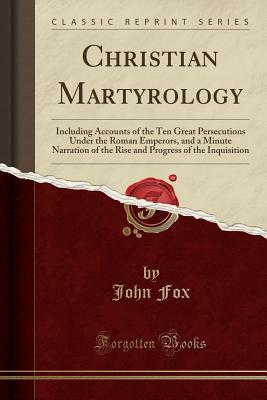- Bible
- Read the Bible
- Bible Versions
- Verse of the Day
- Reading Plans
- Verses by Topic
- Books of the Bible
- Bible Images
- Study
- Commentaries
- Concordances
- Dictionaries
- Encyclopedias
- Sermons
- Bible Atlas & Maps
- BP Wiki
- Devotionals
- Today's Devotionals
- Light of the World
- All Devotionals
- Inspirational Quotes
- More
- Picture Quotes
- Videos
- Inspirational
- Bible Study
- What The Bible Says
- Bible Q&As
- Daily Bread
- Bible by Genre
- Bible Stories
- Random Bible Verse
- Community
- Store
Excerpt from Christian Martyrology: Including Accounts of the Ten Great Persecutions Under the Roman Emperors, and a Minute Narration of the Rise and Progress of the Inquisition
These had great respect paid to them in the primitive church; they were Often raised to holy orders merely on account of their constancy: and on their recommendation, penitent backsliders and apostates, (or the lapsed, as they were termed, ) were admitted into the full communion of the church, without passing through the whole round of penitentiary discipline. However, this was objected to by some of the fathers, particularly by St. Cyprian, and complained of as a matter that was dangerous in its consequences, as tending to subvert and destroy the discipline of the church.
About the Publisher
Forgotten Books publishes hundreds of thousands of rare and classic books. Find more at www.forgottenbooks.comwww.forgottenbooks.com
This book is a reproduction of an important historical work. Forgotten Books uses state-of-the-art technology to digitally reconstruct the work, preserving the original format whilst repairing imperfections present in the aged copy. In rare cases, an imperfection in the original, such as a blemish or missing page, may be replicated in our edition. We do, however, repair the vast majority of imperfections successfully; any imperfections that remain are intentionally left to preserve the state of such historical works.
These had great respect paid to them in the primitive church; they were Often raised to holy orders merely on account of their constancy: and on their recommendation, penitent backsliders and apostates, (or the lapsed, as they were termed, ) were admitted into the full communion of the church, without passing through the whole round of penitentiary discipline. However, this was objected to by some of the fathers, particularly by St. Cyprian, and complained of as a matter that was dangerous in its consequences, as tending to subvert and destroy the discipline of the church.
About the Publisher
Forgotten Books publishes hundreds of thousands of rare and classic books. Find more at www.forgottenbooks.comwww.forgottenbooks.com
This book is a reproduction of an important historical work. Forgotten Books uses state-of-the-art technology to digitally reconstruct the work, preserving the original format whilst repairing imperfections present in the aged copy. In rare cases, an imperfection in the original, such as a blemish or missing page, may be replicated in our edition. We do, however, repair the vast majority of imperfections successfully; any imperfections that remain are intentionally left to preserve the state of such historical works.
BUY NOW
Paperback, 742 pages
Published April 23rd 2018 by Forgotten Books
© 2025 Bibleportal.com All rights reserved.

John Foxe, martyrologist, is remembered as the author of what is popularly known as Foxe's Book of Martyrs, an account of Christian martyrs throughout history but especially emphasizing the sufferings of English Protestants from the fourteenth century through the reign of Mary I.
Foxe's prospects, and those of the evangelical cause generally, improved after the death of Henry VIII in January 1547, the accession of Edward VI, and the formation of a Privy Council dominated by pro-reform Protestants.
Although both he and his contemporary readers were more credulous than most moderns, Foxe presented "lifelike and vivid pictures of the manners and feelings of the day, full of details that could never have been invented by a forger." Foxe's method of using his sources "proclaims the honest man, the sincere seeker after truth."
... Show more